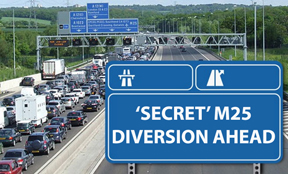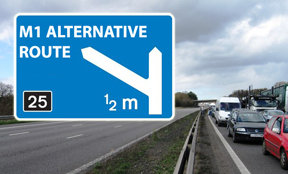
Drivers have a responsibility to report any medical condition which impacts their ability to drive safely, but there is also a list of conditions that must be reported regardless of whether the driver believes they impact driving – but do floaters, or flashers as some call them, fall within such conditions?
Here motoring journalist and expert Pete Barden, who also suffers from the condition, takes a look at exactly what floaters or flashers are, and if they need to be reported to the DVLA regarding a driver’s fitness to drive. Read on to find out all you need to know about the eye condition known as floaters or flashers.
 How a driver with eye floaters may see the road ahead
- but should they report it to the DVLA? (Credit: Pxhere)
How a driver with eye floaters may see the road ahead
- but should they report it to the DVLA? (Credit: Pxhere)
What are floaters/flashers in eyes?
Floaters can be alarming when you first develop them. They typically appear to be small, blurred shapes or shadows that float across your field of vision – often made worse when your eyes move. People describe them in various ways, from spots to tiny cobweb-like shapes or wiggly lines. They are made even more annoying and even worrying, because it is not possible to focus on them – because they are behind the eye's lens.
While they can be scary at first, most people will develop them at some point in their lifetime. Most of the time they are completely harmless, and caused by minute strands of the jelly inside your eye sticking together and throwing a shadow on to the retina when you look at bright objects such as the sky. Foggy days can also be particularly bad for floaters as the white background can highlight them.
Are they dangerous?
On the whole, floaters or flashers are completely harmless and can happen to people of any age. Often they will go away over a period of weeks, months or even years. Even if they do hang around for a long time, the brain will get used to them and after a while the person will barely notice them, if at all.
However, there are rare occasions when the appearance of floaters could be related to something much more serious, such as:
- eye infection
- injury to the eye
- bleeding within the eye
- uveitis, inflammation in the eye
- vitreous detachment
- retinal tear
- retinal detachment
You should always contact a doctor or an accident and emergency department if there are a lot of new floaters appearing suddenly, occasionally with flashes, too. A dark shadow or blurry area appearing in the side or centre of your vision. These could be the sign of a retinal detachment or retinal tear, which could be a medical emergency. Do not drive if you have these symptoms.
-
HEALTH-RELATED GUIDES FOR DRIVERS
-
Do you have to report high blood pressure to the DVLA before driving?
Find out when you must notify the DVLA about hypertension or other health issues that could affect your ability to drive.
-
How to beat amaxophobia – the fear of driving
A guide to understanding and overcoming the anxiety disorder that stops some people from getting behind the wheel.
-
Do I have to tell the DVLA I wear glasses or contact lenses?
Explains the 01 eyesight code on your licence and when you must declare vision correction to the DVLA.
Do I have to tell the DVLA about them?
Providing the floaters are not part of a serious medical event – such as retinal detachment or tear – you are under no obligation to tell the DVLA about them. However, if your ability to drive safely is inhibited by them, you should stop driving and consult a doctor before returning to the road.
Can I still drive if they're caused by a retinal detachment or tear?
If your floaters are caused by these more serious conditions, you will need to let the DVLA know. This does not mean that you will automatically be banned from driving but you will need to speak to the DVLA about the condition and how it might affect your driving depending on its severity. You can log on to the DVLA site to answer questions about your condition here.
Can I still drive buses or lorries if I have them?
You will need to contact the DVLA for advice if you are driving vehicles such as buses, coaches and lorries if you have floaters.

Latest motoring news and guides
Take a look at more of our top motoring-related content here...
-
CAR TAX SHOCK: How much is my car tax going to go up by?
-
CAN I STILL DRIVE?: My driving licence has expired - can I keep driving while I wait for a new one?
-
DRIVERS IN 20MPH PERIL: How fast in a 20mph zone will get a speeding ticket in London
-
TOP EVS FOR BRITS: What is the most popular electric car (EV) for UK buyers?
-
TESTING TIMES: What day of the week are driving tests released?
-
M25 JAM BUSTER: M25 alternative routes revealed
-
SECRET PARKING FINES: Secret parking offences you're committing but don't realise
-
SUNGLASSES SHOCK: Are my sunglasses legal for driving - how to check instantly?
-
NUMBER PLATES EXPLAINED: How old is a car by its number plate? Full list
-
SPEEDING TICKET CHECK: Will I always get a speeding ticket after being flashed
-
AVOID POINTS: Will I get a speed awareness course instead of points?
-
DRIVING ABROAD DOCUMENTS: Do I need an international driving permit for France, Spain, Greece and more
-
WHITE LINES EXPLAINED: What are the rules around double white lines and the risk of £1,000 fine?
-
BRUM: DEAL Do I pay the Birmingham Clean Air Zone at weekends?
-
GOT YOUR NUMBER: What does my driving licence number reveal about me?
-
FAKE COP SHOCK: How to spot a fake undercover police car
-
ELECTRIC LICENCE TO DRIVE: Do I need an electric car licence and driving test in the UK?
-
VAPE RULES: Can I vape in a car with kids in it?
-
LICENCE TIMES: When can I apply for a provisional licence?
-
E-SCOOTER LAWS: Are electric scooters Legal in the UK now? When is the law changing?
-
SLIDERS MUST-KNOW: Can I drive in sliders in the UK?
-
DOT CHECK: What are the black dots on my windscreen for?
-
CAR TRACKER: How can I find out who owns a car
-
CHARGE AND DRIVE: Electric car charging points at UK airports for public use
-
TYRE-CHECK TOOL: How old are my tyres - find out instantly here
-
CAR FUTURE: What happens to a car when the owner dies?
-
SPARE WHEEL RULES: How far and how fast can I drive on a space saver spare wheel
-
TICKET RISK: Can I be fined if the car park ticket machine is not working?
-
M6 JAM BUSTER: Is the M6 Toll Road free in the evening and at weekends?
-
PAY OR NOT PAY: How much is the Tamar Bridge toll and when do I need to pay it?
Subscribe for free motoring and travel news from PeteBarden.co.uk
Author: Pete Barden:
Twitter: @pete_barden
Pete Barden is a qualified journalist who has written and produced for publications including The Sun (thesun.co.uk), New Statesman Media Group, Whatcar? (Whatcar.com) Stuff Magazine (Stuff.tv), Fastcar Magazine (Fastcar.co.uk), Maxim Magazine and UK broadcast stations within the Heart network (Formerly GCAP). Pete specialises in motoring and travel content, along with news and production roles. You can find out more about Pete Barden on LinkedIn.











